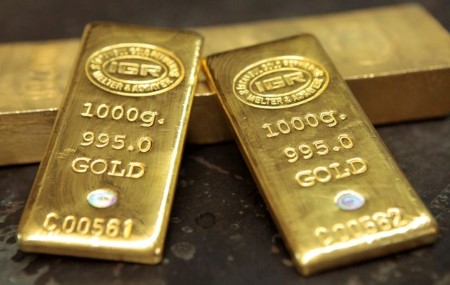




Policy Rate Updates: BSP outlook — cloudy with a chance of rate cut
 DOWNLOAD
DOWNLOAD

January Economic Update: Growth slows, prices rise
 DOWNLOAD
DOWNLOAD

Inflation Update: Up, up, and away?
 DOWNLOAD
DOWNLOAD


Gold edges higher after softer US PPI data

April 11 – Gold prices firmed on Thursday after softer-than-expected US producer prices data boosted hopes for US rate cuts this year, while persistent geopolitical concerns added to the metal’s shine.
Spot gold rose 1.1% to USD 2,360.52 per ounce, as of 2:15 p.m. EDT (1815 GMT). Bullion prices hit an all-time high for an eighth straight session on Tuesday.
US gold futures settled 1% higher at USD 2,372.7.
A Labor Department report showed the Producer Price Index (PPI) rose 0.2% month-on-month in March, compared with a 0.3% increase expected by economists polled by Reuters.
“The PPI data came a bit cooler than expected and this keeps alive the hopes of possible rate cuts by year-end — as a result gold is up,” said David Meger, director of metals trading at High Ridge Futures.
“Central bank buying and geopolitical uncertainty continue to be the pillars of support for the gold market,” Meger added.
The Fed could start interest-rate cuts as early as its late-July meeting, traders bet, after the inflation data.
Gold is traditionally known as an inflation hedge but higher interest rates reduce the allure of holding non-yielding gold.
Meanwhile, data on Wednesday showed that US consumer prices increased more than expected in March.
Recent data suggest it may take more time than previously thought to gain greater confidence in inflation’s downward trajectory, before beginning to ease policy, Boston Fed President Susan Collins said on Thursday.
“For the next leg higher (in prices), we still need to see a return of gold exchange-traded-fund (ETF) demand and that requires the Fed indicating a rate cut,” said UBS analyst Giovanni Staunovo.
Spot silver gained 1% to USD 28.24 per ounce. Platinum rose 2.1% to USD 980.15 and palladium lost 0.9% to USD 1,041.62.
Elsewhere, diversified miner Sibanye Stillwater said it could cut over 4,000 jobs as it restructures its South African gold operation. It has already cut about 2,000 jobs at its platinum group metal operations.
(Reporting by Ashitha Shivaprasad in Bengaluru; Editing by Ros Russell, Shilpi Majumdar, and Maju Samuel)
This article originally appeared on reuters.com





 By Reuters
By Reuters